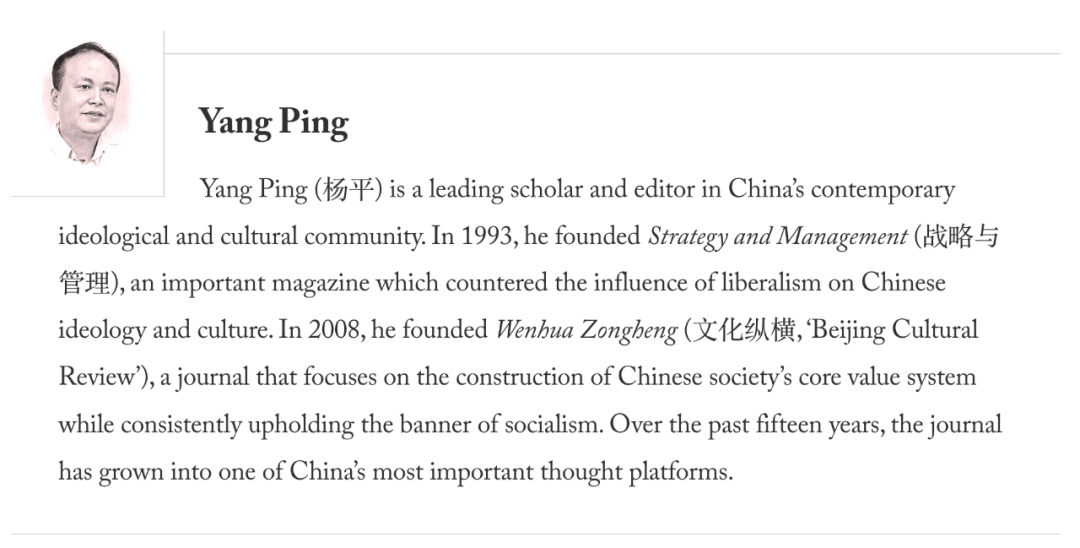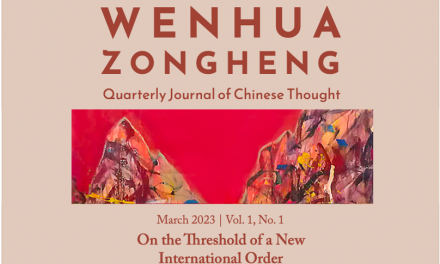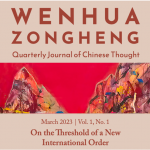The Ukraine Crisis and the Building of a New International System
‘The Ukraine Crisis and the Building of a New International System’ was originally published as the lead article of the June 2022 issue of Wenhua Zongheng (文化纵横). The article urges China, amid the outbreak of the Russia-Ukraine conflict, to consider the dangers of the current international system that it has been striving to integrate into and the possibilities of building a new international system.
The outbreak of the Ukraine crisis has not merely altered the geopolitical landscape, it has severely disrupted the current international order. Particularly, the imposition of extensive sanctions on Russia by the United States and other Western countries has compromised the rules of the existing international system and revealed its true, coercive nature. This crisis should provide a strong reminder to China that it must deepen its ‘worst-case scenario thinking’ (底线思维, dǐxiàn sīwéi) and seriously contemplate, as a major strategic aim, building a new international system parallel to the current Western-dominated order.
▍Preparing for Looming Crises
The current international system is one that is dominated by the Western countries, led by the United States, and liberal capitalist in nature. During periods when liberal capitalism functions smoothly, this system expands globally and appears to be rules-based and fair, able to include most countries and regions of the world. However, during periods of crisis, liberal capitalism will contort itself, abandoning established international rules or seeking to create new ones, exemplified by increasing nativism or deglobalisation where the hegemonic nation relinquishes its purported duties of leadership and returns to power politics.
Amidst the Ukraine crisis, the US and the Western countries have disregarded international norms by forcibly casting Russia out of the global financial architecture, namely the Society for Worldwide Interbank Financial Telecommunication (SWIFT), confiscating Russian state and personal assets, and freezing the country’s foreign exchange reserves. Such measures go far beyond the typical nonviolent means of confrontation employed by nation states such as trade wars, technology blockades, and oil embargoes, and blatantly contradicts the timeless liberal principles that ‘debts must be paid’ and ‘private property is sacrosanct’, among others. These flagrant violations of the so-called ‘rules-based order’ have laid bare the arbitrary, unlawful, and biased character of the international system and the manner in which it can be manipulated by the US and its allies to violently discipline other countries.
From the Chinese perspective, the Ukraine crisis is a warning to China that it must prepare for scenarios in which it is subject to such hostile measures. It is necessary to re-examine the present international order to grasp an accurate understanding of both its benefits and drawbacks, giving up any illusions in its fairness and long-term viability, and, whilst participating in and maximising the utility of the current system, simultaneously making preparations for the construction of a new international order.
Given the size of China, the task of national rejuvenation requires much more than an economic strategy of mere ‘domestic circulation’ (内循环, nèi xúnhuán). To achieve industrialisation and modernisation, China must engage with the world and develop a broader ‘international circulation’ (外循环, wài xúnhuán) by accessing external resources, technologies, and markets. The central task of China’s reform and opening-up policy over the past four decades has been to open the country to the outside world and participate in the global system in order to promote an international environment more favourable to the pursuit of modernisation. At the same time, China has had to take necessary actions when hostile aspects of the current system have threatened the country’s fundamental interests. In the current situation, it is necessary that China, on the one hand, fights steadfastly against the manipulation of the existing system by the US and the Western countries, and, on the other hand, begins to build a new, more democratic and just global system, in partnership with developing countries.
▍China’s Historical Destiny Is to Stand With the Third World
The present world order has not only been shaped by China, Russia, the United States, and Europe, the countries and regions of Asia, Africa, and Latin America have also created a multitude of new regional networks amid the decline of US power. Working with other developing countries is necessary for China to strengthen efforts to build a new international system. The Belt and Road Initiative (BRI), since it was proposed by President Xi Jinping in 2013, has in fact laid the foundation for such cooperation and for the realisation of a new system.
Since the People’s Republic of China was founded in 1949, the Third World has consistently provided China with new spaces to survive and grow and new sources of strength whenever it has faced pressure from superpowers, including the national liberation movements of Asia, Africa, and Latin America in the 1950s and 1960s, the Bandung Conference of 1955 and the Non-Aligned Movement, Mao Zedong’s Three Worlds theory developed in the 1970s, the emphasis on South-South cooperation during the early stages of reform and opening up in the 1980s, the establishment of the BRICS mechanism at the turn of the century, and, most recently, the development of the BRI in the last decade. Over the past 70 years, China has had adopted a wide range of foreign policies, from the ‘lean to one side’ (一边倒, yībiāndǎo) policy with the Soviet Union in the 1950s to the ‘integrating with the world’ (与国际接轨, yǔ guójì jiēguǐ) (or with the US, to be exact) policy at the turn of the century; however, China has, consciously or unconsciously, consistently turned to the Third World whenever it has felt that its independence and sovereignty were threatened.
This relationship with the Third World is China’s historic destiny. Today, as China becomes an important pole in the world and is faced with the hostile containment strategy of the hegemonic United States, it cannot follow the alliance politics pursued by the US and the Soviet Union during the Cold War. Dividing the world into antagonistic blocs would drive humanity to the brink of war and global catastrophe; instead, China should continue to pursue an independent and nonaligned foreign policy, focused on bringing together the many countries of the Third World – which constitute the global majority – to foster new forms of partnership, establish new multilateral networks, and create a new international system.
Reflecting upon the practices and experiences of the BRI until now and accounting for the challenges posed by the Ukraine crisis, China’s approach towards building a new international system should be guided by the following considerations:
First, China’s orientation should be based on strategic rather than commercial interests. China cannot merely be concerned with exporting its production capacity and capital or securing access to external resources and markets for Chinese enterprises; but rather it must prioritise what is necessary to ensure strategic survival and national development. By adopting such a strategic perspective, it becomes clear that the approach taken by many Chinese firms and local governments towards other nations and regions, as part of the BRI, is not sustainable as it has prioritised commercial interests and tended to ignore political-strategic interests.
Second, the creation of the new international system requires the development of a new vision, philosophy, and ideology to guide and inspire efforts to build it. In this regard, the BRI’s principles of ‘consultation, contribution, and shared benefits’ (共商共建共享, gòngshāng gòngjiàn gòngxiǎng) are insufficient. While the United States today rallies the Western camp under the banner of ‘democracy versus authoritarianism’, China must clearly uphold the flag of peace and development, uniting and leading the vast developing world whilst appealing to and persuading more European states to join this cause. President Xi Jinping’s global call for the ‘building of a community with a shared future for humanity’ (人类命运共同体, rénlèi mìngyùn gòngtóngtǐ) should be adapted to the new international situation. The Chinese concept of ‘common prosperity and common development’ should be shared with the world and promoted as a core value in building a new international system.
Third, a ‘Development International’ (发展国际, fāzhǎn guójì) should be set up as an institutional entity to create a new global system. Unlike the Western alliance mechanisms, such as the Group of Seven (G7) and North Atlantic Treaty Organisation (NATO) which are dominated by a minority of wealthy countries, a new global system must address the fundamental issue that the overwhelming majority of the world faces: how developing countries can be more effectively organised under the principle of nonalignment. Loosely organised and nonbinding initiatives such as conferences and declarations are wholly inadequate for this task; an institutional mechanism such as a ‘Development International’ should be promoted and constructed to drive more powerful organisational action and to develop networks of knowledge and culture, of media and communication, of economic cooperation, as well as other projects. In a nutshell, forms of organisational action under the mandate of peace and development should be established and experimented with.
▍The Relationship Between the Two Systems
Building a new system does not mean abandoning the present one.
In the forty years of reform and opening up, China’s direction and goal have been to integrate into the existing international order. As a latecomer to industrialisation and modernisation, China has had no choice but to learn from the Western countries and take in their advanced knowledge and experience. Breaking away from this system would inevitably drive China back to the old road of the ‘closed-door’ (闭关锁国, bìguānsuǒguó) policy of the 1960s and 1970s, cutting the country off from the advanced economies of the present world.
Nowadays, China has travelled a long way down the road of globalisation and has benefited from it; reform and opening up has become bound up with the Chinese people’s basic interests. For this reason, it is neither desirable nor feasible to give up the benefits derived from participating in the current system.
But this by no means negates the urgent necessity of preparing for the threat of the US-led Western alliance sabotaging the present global system. The development of a new international system and the active participation in the present system are two processes that can be implemented simultaneously without conflict, in which the two systems are bound to overlap and interpenetrate each other. When the quantitative changes accumulated by the new system begin to transform into qualitative changes, a brand-new world order will naturally emerge.
乌克兰危机与新型国际体系构建
乌克兰危机的爆发,在改变地缘政治格局的同时,也动摇了现行国际秩序。尤其当美国等西方国家对俄罗斯施加了大量违背现行国际体系规则的制裁时,这一体系的暴力本质便暴露无遗。它强烈地提醒中国人,必须加大底线思维力度,认真思考构建与现行以西方为主导的国际体系相平行的新型国际体系这一重大战略问题。
▍应为可能的危机预作准备
现行国际体系,是以美国为首的西方主导控制的国际体系,其实质是自由主义资本主义国际体系。当自由资本主义运转顺畅时,这一体系向着全球覆盖,并显现出规则性和中立性,能够将大多数国家和地区容纳进来。而当自由资本主义运转不畅,这一体系便会扭曲,逆全球化上升,霸主国家放弃领导责任,实力政治回归,或抛弃国际规则,或另起炉灶重建规则。
此次乌克兰危机,美国等西方国家违背国际规则,强行将俄罗斯踢出国际金融结算系统(SWIFT),没收俄罗斯国家或个人资产,冻结俄罗斯外汇储备,其手段远超贸易战、技术封锁、石油禁运等原有的民族国家间非暴力对抗手段,而是公然违背“欠债还钱”“私有财产神圣不可侵犯”等古老又现代的原则,充分暴露出现行国际体系非规则性、非中立性的一面,以及美国西方操控的国际体系的暴力政治的本质。
乌克兰危机提示中国人,必须为类似的危机预作准备。其中的核心要义,在于重新审视当今国际秩序,准确把握其中的利与弊,放弃幻想,在参与并用好现有的国际体系的同时,尽快准备新型国际体系的构建。
以中国的体量,欲完成民族复兴伟业,仅仅局限于“内循环”是不够的。中国的工业化和现代化,必然要走出去,通过利用外部资源、技术和市场,形成广泛的外循环。中国近40年改革开放的核心任务之一,就是对外开放,加入现有国际体系,搭建有利于中国现代化的国际关系网络。然而,当现行国际体系发生扭曲变形,并可能伤害到中国的根本利益时,中国当然要有所行动。一方面,要通过坚定的斗争,抗衡美国等西方国家对现行国际体系的操控;另一方面,则应逐渐搭建以中国为主导的新型国际体系。
▍选择第三世界国家是中国的历史宿命
当今世界,中、俄、美、欧之外,是广大的亚、非、拉国家和地区,是美国力量收缩之后的大量新中间地带。向这些国家和地区寻找新的力量源泉,是中国建构新型国际体系的当然选择。起自2013年,由习近平主席倡导的“一带一路”倡议,事实上已经构成了新型国际体系的实现基础。
新中国成立以来,每当中国在超级大国压迫之下欲寻找新的生存发展空间和新的力量来源时,第三世界国家便会自动成为不二选择。从上世纪50~60年代的亚非拉民族解放运动,到70年代毛泽东的“三个世界理论”,从80年代改革开放时代对于“南南合作”的热情推动,到世纪之交“金砖五国”机制的探索,乃至最近10年的“一带一路”倡议。这70多年间,虽然经历了50年代对苏联的“一边倒”,经历了世纪之交的“与国际接轨”(实质是与美国接轨),但只要中国感受到独立自主地位面临威胁时,便会自觉不自觉地转向广大的第三世界。
这恐怕就是中国的历史宿命。当今日中国已经崛起为世界一极,并面临霸主美国的全面遏制之时,它的选择并不会重复苏联和美国的结盟政治道路,以集团对抗助推世界走向危险的战争边缘,而是始终保持不结盟的独立自主姿态,同时将更广大的第三世界国家团结起来,构建新型伙伴型关系,由此形成独特的新型国际关系网络和新型国际体系。
总结“一带一路”迄今为止的实践,面对乌克兰危机之际的挑战,这一新型国际体系应该具备如下特质:
第一,这一体系应该是战略性的,而非商业性的。它不仅是中国的产能输出与资本输出需求,也不仅是中国企业走出去寻找外部资源与外部市场的需求,而且是服从于中国的战略发展与战略生存的根本需求。在这样的战略目标下,目前中国许多企业和地区对“一带一路”沿线国家只讲商业利益、不讲政治战略利益的行为便是不可持续的。
第二,新型国际体系的构建必须有新的理念和愿景,必须有新型意识形态的指引,工具方法层面的“共商、共建、共享”是远远不够的。今日美国,以“民主vs威权”为旗帜团结西方阵营,中国应鲜明地举起“和平与发展”的旗帜,团结带领广大的发展中世界,并说服影响更多的欧洲国家。“人类命运共同体”在新的形势下应得到新的解释,中国的“共同富裕与共同发展”模式应该在构建新型国际体系时作为核心价值输出到全世界。
第三,新型国际体系应以“发展国际”作为组织载体。相比于G7、北约等西方国家结盟机制,广大发展中国家在不结盟机制下如何进行高效的组织动员,是摆在新型国际体系构建面前的一个关键课题。在这方面,仅有松散的论坛、项目等组织形式是远远不够的,应推动形成类似“发展国际”的组织机制,推动更加强有力的组织行动,并在此基础上,形成发展国际知识与文化网络、发展国际媒体与传播网络、发展国际工商企业合作网络等组织机制。总之,要探索和形成以“和平与发展”为主题的国际性的组织行动。
▍如何处理两种国际体系的关系
构建新型国际体系,并不意味着抛弃现有的国际体系。
改革开放40年,中国就是以融入现有国际体系为方向和目标的。由于中国在工业化和现代化道路上后来者的身份,向西方世界学习,吸收其先进的知识和经验,就成为不二选择。一旦脱离这一体系,中国势必会回到上世纪60~70年代“闭关锁国”的道路,与现有世界的先进部分丧失联系。
今天,中国已经在全球化的道路上愈走愈远,成为全球化的受益者,改革开放已经成为中国人民的根本利益。因此,放弃这一参与现行国际体系而来的根本利益,既不可取,也不可行。
但这绝不意味着我们对于以美国为首的西方世界破坏现行国际秩序的危险不做准备。应该认识到,发展建设新型国际体系是可以与积极参与建设现行国际体系并行不悖、互不冲突的。新的体系是增量,旧的体系是存量,它们一定会你中有我,我中有你。当新体系的发展由量变达到质变的时刻,一个崭新的世界秩序就会自然形成。
本文发表于《文化纵横》2022年6月刊,该期目录如下,欢迎订阅纸刊查看更多内容:
— 2022年6月新刊目录 —
▍编辑手记
乌克兰危机与新型国际体系构建
《文化纵横》编辑部
▍域外
摆脱“资源诅咒”?——海湾六国的工业化与经济多元化
张若枫
白宫新一代对华战略操盘手的思想素描
杨博文
▍封面选题:巨变来临——俄乌冲突改变世界
俄乌冲突在2022 年爆发,以出人意料的方式改变着整个世界格局。冲突爆发以来,以美国为首的西方把国际规则作为武器对俄进行轮番制裁,深刻且全面地动摇“二战”后几十年来的国际治理体系,和平与发展的时代主题面临前所未有的挑战。俄乌冲突后的世界将向何处去?
跨越俄乌冲突陷阱:重新思考以规则为核心的国际秩序
曹远征
构建“新三环”:面对全面脱钩可能的中国选择
程亚文
作为帝国间冲突的俄乌战争
张昕
欧洲为什么不能掌控自己的命运?
魏南枝
重振领导力:俄乌冲突中的英国战略
孔元
▍专题:人类文明新形态
强世功
正是在这短短十几年中,中国看待世界的眼光和心态也悄然发生了变化:从凸显中国特色的特殊主义叙事,转向更为包容世界的普遍主义叙事;从追求被西方承认的刻意努力,转向平和心态的自我认同。这种变化最直观地体现在两次奥运会的开幕式上。
王立胜、晏扩明
▍观念
史观重建:从“主旋律”到“新主流”
陶庆梅
2021年《觉醒年代》《山海情》等作品的出现,不但打破了“主旋律”与大众文化之间的界限,在市场上创造出良好的口碑;更重要的是,它们通过开辟一种新的历史叙事方式,呼应了这个时代被掩藏着的某种社会情绪,带动了更多年轻观众的情感,造就了属于这个时代的主流价值。
周安安、吴靖
从“未来人”到“顽童”——日本动漫与社会秩序的张力
潘妮妮
从不同时期的代表性作者与作品中,我们看到了日本动漫文化中未成年人位置的变迁:从改造世界的“未来人”,到被教养的未成年人,再到轻视成人世界并主动疏离的“顽童”。这反映了并不存在一个价值统一的日本动漫文化,正如战后日本成人社会的思潮也并非始终如一。
▍社会结构变迁
“波兰尼时刻”在当代中国
郦菁
中国无法避免全球“波兰尼时刻”重现带来的社会压力和不确定性;并且,由于自身庞大的经济体量和重要的政治地位,中国必将在其中扮演重要的角色。
▍公益理论与公益实践
社会组织专业化的中国实践:慈弘基金会的探索
张婧
▍反思美国模式
重新审视“地缘政治学”——一个世界史的视角
方旭
韩国“单一民族”的神话与现实
郑立菲
《文化纵横》国际传播系列由三大洲社会研究所(Tricontinental: Institute for Social Research, 网站:www.thetricontinental.org)和东声(Dongsheng News,网站:www.dongshengnews.org)协作翻译并制作,有英语、西语、葡语三个版本。每期根据不同主题,从《文化纵横》杂志过往发表文章中,选择3-5篇文章进行编译,预计每季度发布一期。2023年第1期主题为“重构现代世界体系”,主要分析全球紧张局势加剧背景下的俄乌战争的全球影响,追溯中西关系的历史轨迹,并探讨团结广大第三世界国家、推动构建新型国际体系的可能性。











